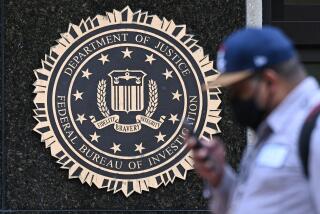North Said He Told Reagan Contras Got Iranian Money, Secord Testifies
- Share via
WASHINGTON — Lt. Col. Oliver L. North said he told President Reagan that “it was ironic” that some of the money from the Ayatollah Ruhollah Khomeini’s Iran “was being used to support the contras, “ retired Maj. Gen. Richard V. Secord testified today.
Secord, testifying before congressional Iran-contra committees about his role in the covert deals, also said he tried in vain to talk to Reagan to persuade him to defend the Iran arms policy before news of the diversion of arms sale money to the contras was announced.
But Secord said he was told by national security adviser John M. Poindexter “they’d already built a wall around the President.” Reagan has repeatedly denied that he knew anything about the diversion to the contras and said he was unaware of private military aid going to contras. Secord told House and Senate select committees that he had “no direct knowledge about what the President knew or didn’t know.”
But Secord said he was told on a number of occasions that the President “was informed of my participation in the contra and later in the Iranian operations.”
“I was told by Admiral Poindexter in January, 1986, that not only was he pleased with the work that I’d been doing but that the President was as well,” Secord said.
“On a few occasions, I’d heard Oliver North, in an offhand and I think humorous vein, remark that in some conversations with the President he had mentioned it was ironic that some of the ayatollah’s money was being used to support the contras,” Secord said.
“Whether he had actually said that to the President or whether he was joking with me, I’m not sure. It was not said to me in a way that I took it as a joke,” he said.
‘Despicable Character’
Earlier, Secord testified that former national security adviser Robert C. McFarlane rejected an arms-for-hostages scheme after calling an Iranian middleman “one of the most despicable characters” he’d ever met but that the Reagan Administration later embraced it.
Secord said that during several meetings with Iranian middleman Manucher Ghorbanifar the subject of U.S. hostages held in Lebanon was always discussed in the context of the arms sales.
“He was very interested in what I would characterize as U.S. high technology weapons systems,” specifically missiles. “He came up with different formulas--so many Phoenixes (missiles) for so many ‘boxes,’ as he called them, which was his code word for hostages,” Secord added.
Blatant Proposal
“It was blatantly a set of proposals of arms for hostages.”
At one December, 1985, meeting in London, with McFarlane in attendance, Ghorbanifar made his now-familiar pitch.
“Very quickly that meeting degenerated . . . into propositions of U.S. arms for U.S. hostages in Lebanon. Ghorbanifar pursued that line with Mr. McFarlane for a long time, far too long,” Secord said.
Afterward, “McFarlane was very unhappy, very very unhappy with this session,” Secord said, adding that McFarlane said he would “report this information back to the President.”
Secord said that, as they flew back to Washington, “McFarlane said this (Ghorbanifar) was one of the most despicable characters he’d ever met.”
More to Read
Sign up for Essential California
The most important California stories and recommendations in your inbox every morning.
You may occasionally receive promotional content from the Los Angeles Times.









